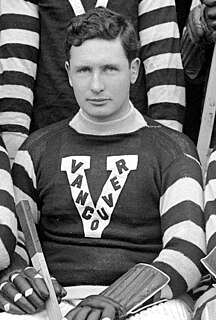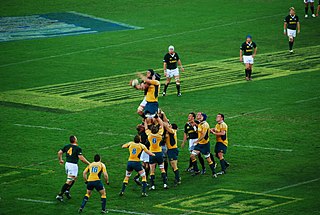Related Research Articles

Winter sports or winter activities are competitive sports or non-competitive recreational activities which are played on snow or ice. Most are variations of skiing, ice skating and sledding. Traditionally, such games were only played in cold areas during winter, but artificial snow and artificial ice allow more flexibility. Playing areas and fields consist of either snow or ice.

The 1976 Winter Olympics, officially known as the XII Olympic Winter Games and commonly known as Innsbruck 1976, was a winter multi-sport event celebrated in Innsbruck, Tyrol, Austria, from February 4 to 15, 1976. The Games were awarded to Innsbruck after Denver, the original host city, withdrew in 1972. This was the second time the Tyrolean capital had hosted the Winter Olympics, having first done so in 1964.

Curtis Lester Patrick was a Canadian professional ice hockey player and coach associated with the Victoria Aristocrats/Cougars of the Pacific Coast Hockey Association, and the New York Rangers of the National Hockey League (NHL). Along with his brother Frank Patrick and father Joseph Patrick, he founded the Pacific Coast Hockey Association and helped develop several rules for the game of hockey. Patrick won the Stanley Cup six times as a player, coach and manager.
The Pacific Coast Hockey Association (PCHA) was a professional ice hockey league in western Canada and the western United States, which operated from 1911 to 1924 when it then merged with the Western Canada Hockey League (WCHL). The PCHA was considered to be a major league of ice hockey and was important in the development of the sport of professional ice hockey through its innovations.

Francis Alexis Patrick was a Canadian professional ice hockey player, NHL head coach and manager. Raised in Montreal, Patrick moved to British Columbia with his family in 1907 to establish a lumber company. The family sold the company in 1910 and used the proceeds to establish the Pacific Coast Hockey Association (PCHA), the first major professional hockey league in the West. Patrick, who also served as president of the league, would take control of the Vancouver Millionaires, serving as a player, coach, and manager of the team. It was in the PCHA that Patrick would introduce many innovations to hockey that remain today, including uniform numbers, the blue line, the penalty shot, among others. His Millionaires won the Stanley Cup in 1915, the first team west of Manitoba to do so, and played for the Cup again in 1918.

Canada competed at the 2006 Winter Olympics in Turin, Italy, with a team of 196 athletes and 220 support staff.

Winter Sports in Australia encompasses a great variety of activities across the continent of Australia, including winter sports played in snow and ice such as ice hockey. Climate varies considerably from the tropical North to temperate South in Australia, and sporting practices vary accordingly. Ice and snow sports like Skiing in Australia are conducted in the high country of the Australian Alps and Tasmanian Wilderness. Australia has relatively low mountain ranges, but a long history of participation in recreational skiing and the Winter Olympic Games. Australians have won olympic gold in ice skating, skiing and snow-boarding events. Australia's generally flat geography and usually mild winter climate otherwise provide ideal conditions for international non-snow/ice winter sports and team games like Rugby Union Football, Rugby league Football and Association Football (Soccer), which are all popular sports during the Australian winter and in which Australia has enjoyed considerable international success. Australian rules football is a home-grown winter football code with a wide following throughout Australia. Many other sports are also played or watched in Australia through the winter season.

Denman Arena was an indoor arena located in downtown Vancouver, British Columbia. The arena was located at 1805 West Georgia Street at the northwest corner with Denman Street. It opened in December 1911 and was destroyed by fire in 1936. Its primary use was for ice sports such as ice hockey. It was the home ice rink of the Vancouver Millionaires professional ice hockey team, and was the location of 1915 Stanley Cup championships. The arena was also used for other sports, musical performances and public assemblies. It was an assembly point for Canadian servicemen during World War I. The 10,500 seat arena was the largest in Canada at the time, and introduced mechanically frozen or "artificial" ice to Canada.

Canada hosted and participated in the 2010 Winter Olympics in Vancouver, British Columbia. Canada previously hosted the 1976 Summer Olympics in Montreal and the 1988 Winter Olympics in Calgary. Canada sent a team of 206 athletes, including participants in all 15 sports, and finished with 14 gold medals and 26 in total, surpassing their previous best medal performance at the 2006 Winter Olympics. The 14 gold medals also set the all-time record for most gold medals at a single Winter Olympics, one more than the previous record of 13 set by the former Soviet Union in 1976 and Norway in 2002. This record was matched at the 2018 PyeongChang Games when Germany and Norway tied it, and broken at the 2022 Beijing Games by Norway. Canada was the first host nation to win the gold medal count at a Winter Olympics since Norway at the 1952 Winter Olympics.

China participated at the 2010 Winter Olympics in Vancouver, British Columbia, Canada, sending its largest delegation at a Winter Olympics with 94 athletes. China had its best ever Winter Olympics medal finish, winning five gold medals and eleven in total, finishing seventh in the medal standings.

Switzerland participated at the 2010 Winter Olympics in Vancouver, British Columbia, Canada. 146 athletes entered 14 sports.

The Czech Republic participated in the 2010 Winter Olympics in Vancouver, British Columbia, Canada, sending 92 participants, the largest Czech team ever to appear at the Winter Olympics. The Czechs competed in the majority of events, except curling, skeleton and women's ice hockey. Hockey player Jaromír Jágr served as flag bearer at the opening ceremony.
This article contains a chronological summary of major events from the 2010 Winter Olympics in Vancouver, Canada.

The first instances of organized women's ice hockey in Canada date back to the 1890s when it was played at the university level. The Women's Hockey Association claims that the city of Ottawa, Ontario hosted the first game in 1891. In 1920, Lady Meredith, wife of Sir Vincent Meredith of Montreal donated the Lady Meredith Cup to the Quebec Ladies' Hockey Association, said to be the first women's ice hockey trophy created for a competition in Canada. In February 1921, a women's North American championship series was played in conjunction with the Pacific Coast Hockey Association. The Vancouver Amazons from the 1920s became one of the first professional teams. They were the first women's hockey team from Vancouver to participate in the invitational women's hockey tournament sponsored by the Banff Winter Carnival. On December 16, 1922, a meeting was held to announce the formation of the Ladies Ontario Hockey Association. The Dominion Women's Amateur Hockey Association was founded in winter 1933. Lady Bessborough, the wife of Governor General of Canada Lord Bessborough donated a championship trophy.

The Vancouver Amazons were a women's ice hockey team from the 1920s. They were the first women's hockey team from Vancouver to participate in the invitational women's hockey tournament sponsored by the Banff Winter Carnival. The Amazons competed in 1921. The Amazons qualified for the final that year but were defeated. The team was owned by Frank Patrick, who also owned the Vancouver Millionaires. Patrick would organize a tournament featuring the Amazons, the Seattle Vamps and the Victoria Kewpies. The Amazons went undefeated in the tournament and did not allow a goal. The Amazons were West Coast Women's champions. As the tournament featured a team from the United States, many consider this the first ever international women's hockey competition.

The history of women's ice hockey in the United States can be traced back to the early 20th century. In the 1920s, the Seattle Vamps competed in various hockey tournaments. In 1916, the United States hosted an international hockey tournament in Cleveland, Ohio, that featured Canadian and American women's hockey teams.

The Fernie Swastikas were a women's hockey team that was formed in 1922 in Fernie, British Columbia. Their uniform used as a symbol the swastika, which before World War II was a common religious symbol, and especially a sun sign. In 1923, the Swastikas won the Alpine Cup at the Banff Winter Carnival women's ice hockey championship. There were two other teams called the Swastikas, one in Edmonton, Alberta, and another the Windsor Swastikas of Windsor, Nova Scotia.

The Edmonton Monarchs were a women's ice hockey team that started as the Edmonton Victorias in 1914. The club represented Victoria High School in Edmonton.
The Banff Winter Carnival women's ice hockey tournament was an ice hockey tournament played in Banff, Alberta, Canada. In the early years, it was contested to determine the women's ice hockey provincial champions of Alberta. In later years, the winner would be awarded the Alpine Cup.
The Edmonton Rustlers were a women's ice hockey team that competed during the Great Depression.
References
- ↑ Len Corben (February 11, 2010). "Instant Replay: Discovering Doris Parkes". NorthshoreOutlook.com. Retrieved 28 April 2010.[ permanent dead link ]
- ↑ "Development of Snow Sports on Hollyburn Mountain". HollyburnHeritageSociety.com. Archived from the original on 13 April 2010. Retrieved 28 April 2010.
- ↑ Women on Ice: The Early Years of Women's Hockey in Western Canada, Wayne Norton, p.102, Ronsdale Press, 2009, ISBN 978-1-55380-073-6
- ↑ Women on Ice: The Early Years of Women's Hockey in Western Canada, Wayne Norton, p.103, Ronsdale Press, 2009, ISBN 978-1-55380-073-6